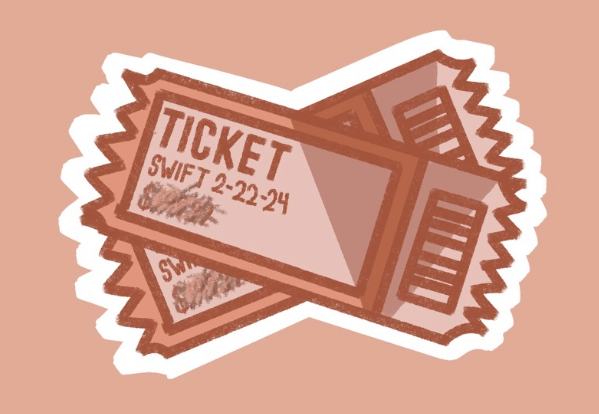When Charles Dickens went on his second reading tour, “sidewalk men”—the 19th-century version of modern-day ticket scalpers— paid bystanders to wait in mile-long queues to obtain tickets for $5 and resell them for $50.
But for concert fans, ticket scalping has since shifted from sidewalks to the internet, where scalpers use online bots to seize tickets in bulk to resell on secondary sites to generate more profit. Despite ticket sales websites such as Ticketmaster enforcing policies such as presale codes in hopes of barring ticket scalpers, ticket reselling continues to rampage. Ticket reselling has expanded into a rampant industry that blurs the line between fans and profiteering middlemen, where buying tickets can feel more like a high-stakes gamble rather than a simple transaction. The harmful impacts of ticket reselling must be regulated to protect consumers and ensure the sustainability of the concert industry.
At its core, the practice of ticket reselling undermines the connection between performers and their audience. When fans buy tickets from a secondary source, the tickets are most often resold at inflated prices, effectively pricing out those who are unwilling or cannot afford to pay exorbitant amounts. Once ticket scalpers, armed with automated bots and inside connections, lay hands on tickets in bulk, fans have no choice but to turn to secondary ticketing platforms, such as StubHub and SeatGeek. Moreover, ticket reselling deprives fans of the opportunity to buy tickets at face value which creates unfair competition and makes it difficult for consumers to access tickets.
“People are making a profit unfairly. If you wanted to buy a ticket for a concert and not go to it and just, like, make money, then you’re taking a chance away from people who actually wanted to go to the concert and could’ve bought it for cheaper,” Lydia Ding (‘24) said. Recently, Ding attended NF’s HOPE tour, buying her tickets through Ticketmaster, the official primary ticketer for NF’s concerts.
Not only does ticket scalping take away from fans, but it also creates disparities in revenue distribution. Ticket resellers divert profit away from performers, artists, and even event organizers and venues. When tickets are resold at higher prices on different platforms other than the platform the artist is selling on, the profits generated by scalpers do not benefit the creators or organizers of the event. According to the National Bureau of Economic Research (NBER), ticket prices in the resale market are 41% above face value on average.
Fans of big-name artists, such as Taylor Swift, Drake, and Nicki Minaj, are impacted the most by ticket reselling. Popular artists often set their ticket prices at higher points, confident that their loyal fanbase will still purchase them. However, ticket resellers will price these already expensive tickets to an even higher price. According to SeatGeek, a ticket resale marketplace, the average price of a resold Taylor Swift ticket is $1,311. In the United States, depending on the section, face-value tickets to Taylor Swift’s The Eras Tour ranged from $49 to $499. Ticket scalpers capitalize by targeting groups of enthusiastic fans and consistently profit by artificially inflating prices.
At Cherry Hill High School East East, there is a concert culture that is prevalent to the point that some skip school to queue up for tickets. As an avid concert attendee, Romy Albuher (‘26) believes that ticket reselling should be regulated. Having been to at least 10 concerts in the past year, Albuher has been personally affected by ticket reselling, being forced to pay around $400 for a Harry Styles concert ticket for her sister’s birthday present, when the face value was around $100.
“It’s gotten to the point where the [prices] keep going up and up, and people can’t go to shows because it’s too expensive,” said Albuher (‘26).
The unchecked development of ticket scalping has turned into a cycle of exploitation that erodes trust in the integrity of the ticketing system and requires regulation to address ticket manipulation.
Critics may argue that regulating ticket reselling infringes upon individual liberties and the free market. Imposing restrictions on any methods of ticket selling may interfere with the natural dynamics of supply and demand and limit individual freedom to engage in monetary transactions.
“I think it shouldn’t be regulated because it’s the people’s choice. It’s their own strategy…as a way to make more money,” said Remy Choi (‘27).
However, the concept of the free market and individual liberty must be balanced with considerations of consumer protection. Unregulated ticket reselling often leads to unfair outcomes, where fans are priced out of events due to inflated prices set by scalpers. In its current form, ticket reselling leaves fans with limited options and creates an environment of exploitation. Regulation of ticket reselling will establish a framework that promotes fair competition and honesty within the thickening industry. Measures such as anti-bot policies and capping resale prices will protect consumers from various practices while allowing for legitimate resell activities to take place simultaneously.
Furthermore, ticket regulation does not mean outright prohibition. Individuals maintain the freedom to buy and sell tickets through secondary sources. Still, safeguards will aid in preventing sales abuse and ensure that tickets are distributed fairly by giving everyone the same opportunities.
Ticket reselling must be regulated to create a more equitable and transparent ticketing industry that benefits both consumers and sellers.
Ticket reselling needs to be regulated to preserve future events
Story continues below advertisement

